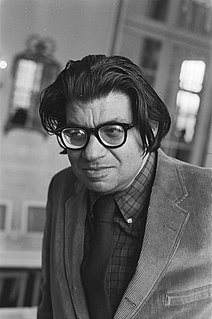A Quote by K.K. Raghava
If technology is not a metaphor for memory, what is it?
Quote Topics
Related Quotes
Digital technology can be a great resource, but it can also be a pernicious one, so it's how we, as a society, really study the cognitive impact of that and use evidence-based research to go after the technology designers to do a better job of dealing with the problems of memory and attention we are seeing.
You could make a good case that the history of social life is about the history of the technology of memory. That social order and control, structure of governance, social cohesion in states or organizations larger than face-to-face society depends on the nature of the technology of memory - both how it works and what it remembers. In short, what societies value is what they memorize, and how they memorize it, and who has access to its memorized form determines the structure of power that the society represents and acts from.
My poems always begin with a metaphor, but my way into the metaphor may be a word, an image, even a sound. And I rarely know the nature of the metaphor when I begin to write, but there is an attentiveness that a writer develops, a sudden alertness that is much like the feel of a fish brushing against a hook.







































